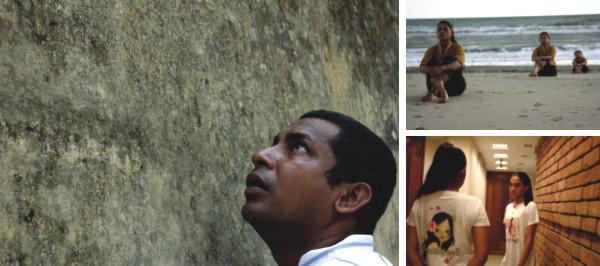Film
 |
Nusrat Imroz Tisha as Ruba, the woman who must find herself in a hostile society. |
During the last few years undoubtedly Mostafa Sarwar Farooki and his fellow directors have set a new trend in Bangladeshi filmdom, which has been appreciated by many and has been criticised as well. "Third Person Singular Number" is the latest venture of this trend, and of course, more polished and effective than the previous efforts in terms of theme and presentation. Analysing the predicament of a single woman in a male dominated society is definitely not something innovative from the world movie perspective, but dealing with the theme set against the backdrop of contemporary Dhaka is of course a new dimension in the current trend of Bangladeshi cinema.
Farooki does not concentrate on any single family or ambience for developing the storyline of the movie, rather his protagonist Ruba, a young married woman whose husband is in jail, encounters people from different status-- from the dirty old man from Old Dhaka to rich businessmen of the posh area. In each case, the male characters have been portrayed as lechers, even in case of featuring the character of Tapu, the established singer who gives a hand to the woman in her bad days and pretends that he does not want any return. On the other hand, the female characters that Ruba encounters have traditional mindsets that do not allow a woman to live single.
It is, however, very difficult for a filmmaker to develop a story gradually featuring all the sectors of the society in a single movie. It cannot be said that Farooki does so in the movie. Rather, "Third Person Singular Number" is a realistic study of a few cases with a common theme: How much freedom does a woman enjoy in society? The approach is not conventional, rather, a successful experimentation of breaking the structure of the conventional movie trend of having a uniform storyline.
The movie begins with a series of nightmarish fragmented small scenes to establish the struggle of a woman who wants to live alone, being frustrated by members of her family as well as her in-law's house accompanied by an effective soundtrack. The skill of the director in developing the flashbacks and creating a kind of surrealistic effect where the protagonist encounters her past-- the character at the age of sixteen as well as six -- is praiseworthy. These characters appear in the form of rationality to remind the protagonist that an early age was adverse to the idea of extra marital affairs and subsequently this makes the protagonist's present situation, especially her thought process, more complicated.
All the characters in Farooki's film are restless. Such presentation of characters is effective in representing the chaotic situation prevailing in society, however, they sometimes do not go well while presenting scenes of tension realistically. In fact, many scenes of tension have not been developed aptly and it will not be a misinterpretation if it is said that these sequences have been abruptly done.
Is it because of poor screenplay or excessive use of improvisation -- a technique frequently used by Farooki -- or due to some lacking in the small screen actors to perform on the big screen? Whoever is responsible does not matter, but the fact is that sequences such as Ruba's approach of seeking shelter at her cousin's house, her meeting with her husband at the jail gate and her encounter with her sister's mother-in-law do not have any touch of reality and could have been presented more aesthetically.
Most of the characters besides Abul Hayat and Rani Sarkar do not have much experience performing in movies. Both seasoned actors have performed well in their short presence in the movie. Musharraf Karim is also impressive in the role of Ruba's husband who is in jail with a lifetime imprisonment sentence. Of course popular singer Tapu's first time appearance in a movie in the role of a prominent contemporary singer is praiseworthy. Aporna Ghose as Ruba's cousin is also impressive. For Nusrat Imroz Tisha, who is quite popular on the small screen, to handle the diverse character of Ruba in "Third Person Singular Number" is indeed a challenging task. In the sequences, where she gets some respite chitchatting with her childhood friend Tapu, whom once she had refused as a suitor, Tisha is very impressive. She could have, however, expressed the pathos of her character more intensely.
The film having an intriguing title is inspired by Syed Manzoorul Islam's novel, titled "Tin Parber Jibon O Kichhu Bastab Case Study". Playwright Anisul Huq and Farooki jointly have written the screenplay.
The much-a waited film was released simultaneously in six theatres across the country on December 11. It drew attention for its soundtrack, which was released earlier and its international premiere in a prestigious festival. "Third Person Singular Number", an Impress Telefilm production, had its world premiere on October 10 at the 14th Pusan International Film Festival, South Korea. The film participated as part of 'A Window on Asian Cinema' category at the festival, which includes low-budget, independent films from “marginal” countries, highlighting young directors, who are either creating new currents or playing a pioneering role in the established film industry. It also got appreciation participating at the Middle East International Film Festival.
The film is dedicated to recently deceased cinematographer Shubrata Ripon, who passed away just after finishing the film.
 |
Left: Musharraf Karim as Ruba’s jailed husband. Right: Scenes from the film |
Copyright
(R) thedailystar.net 2009 |
